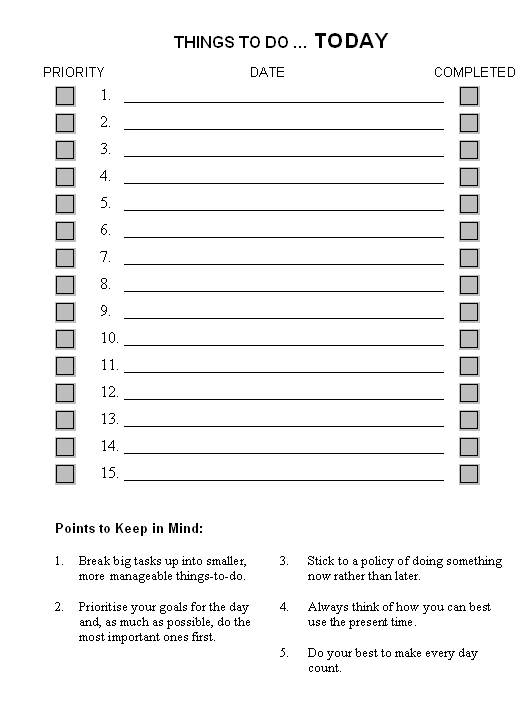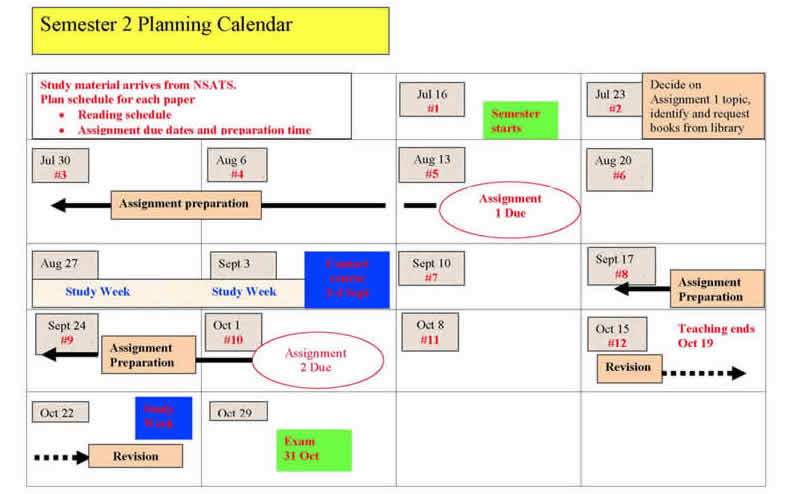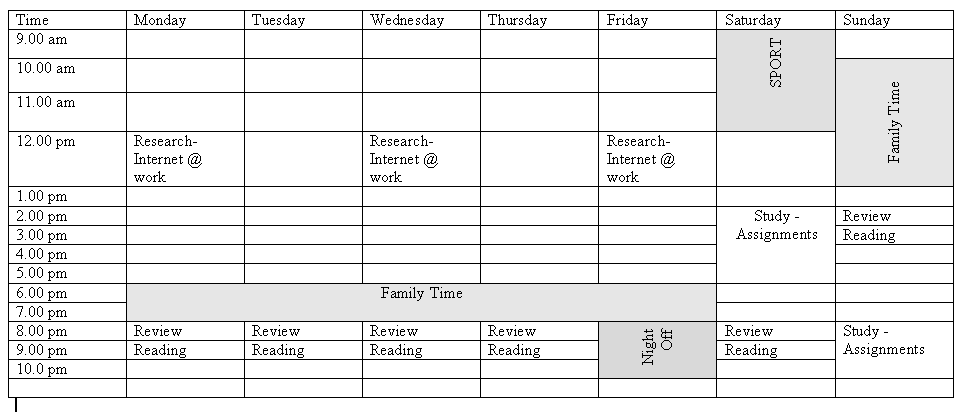Time management for distance students
Time management is crucial for distance students because of the flexible nature of distance study, the fact that distance study is fitted into an already existing busy life, and the distance from class and other students who can indirectly help each other keep up-to-date. It is important that distance students use their time wisely.
Semester Timetable
A semester timetable is very important as it gives you and others an overview what you are doing during the semester. Points to remember while completing a semester timetable are:
It is important to complete this as soon as possible as it will give you an indication of your workload.
By entering assignment due dates for all courses you will be able to see possible high-pressure times, such as several assignments due in the same week. This is very common but can be planned for and coped with. A lecturer is not going to be sympathetic about two assignments due on the same day as many others have the same problem. Part of being a successful independent learner is personal timetabling of the semester schedule.
- Personal and family events should be included so that you can plan for any potential clash early on.
- Support from those you live with is vital, and your friends/flatmates deserve to know when you are going to be around, and are more likely to be supportive if they know when your assignments are due.
- Doing study is not meant to exclude you from family events such as weddings. You can do both.
- Tell your employer you are studying - most are very supportive. They may give you a day's study leave before your exam. They may refund your fees if you pass.
- Make sure you do not omit work deadlines in your weekly or daily schedule.
- Many working students have access to high speed internet at work, and employers are usually quite open to library research of databases and e-journals during lunchtimes. Carrying out this time-consuming task that eats into study time in shorter bursts during lunchtime at work gives you more time to focus on reading for and writing assignments at home.
Three weeks preparation is ideal for assignments.
However, think ahead by choosing the topic early and getting books from the library. This is vital in a tight time schedule. Everyone else in your class is probably looking for the same books! If you are lucky enough to get the book first, use it. You may well be hit with a recall notice in a few days' time because other students have requested it. Use a photocopier for the best bits. You can also request the book again after you have returned it.
- This allows you to see how close together your exams are and plan accordingly.
- Knowing these and keeping them in mind gives you time for exam preparation.
- It also reminds you to inform your employer early on that you may want leave for study and/or to sit the exam.
- All good schedules have gaps as well as time set aside for your leisure and personal life.
- These gaps - called flexi-time - are there so that there is time for the unexpected or for the tasks that take too long.
- You will get stressed if you do not allow time for personal matters as well as work.
- It important that you share this information with other people / friends / family as they may be able support you when needed and provide some extra motivation.
If you can afford it, attend the contact workshop(s) offered on one of the campuses. These give you the opportunity to meet the lecturer(s) in person, work alongside and with other students, some of whom may become friends, and allow you to clarify any problems.
It important that you share this information with other people/ friends/family as they may be able support you when needed and provide some extra motivation.
Microsoft Word version ![]() (112KB)
(112KB)
Weekly planners
Although the semester plan gives you an important overview, it is also important to have a weekly plan with your regular commitments entered on it. This would include all your household duties, gym sessions, hours at work, sports practises, church times, plus social time with friends and family.
Once this is filled in, you have a good idea of how much time is left for study and reading and writing assignments. (If there is very little time left, then you may have to consider reducing some of your commitments during semester time.)
Then schedule in regular study times for each course. Once again, this plan should be available to people you live with so that they can see when you are doing your homework each day and when you are available.
Helpful strategies from other students to protect your homework time:
- Set a family homework time if you have secondary age children and get everyone working at the same time.
- Set the answer-phone with a message that says, “The ??? family are doing their homework at present. You can contact them after 9.30 pm or in the morning between 7.45 and 8.30 am.”
- Turn off all cell phones.
- Use the internet after you have done your study - this includes checking your e-mail.
- Tell your partner and family when you are having a very busy week.
- Do not start the washing or any other housework chore that you will follow up.
- Write the weekly plan at the same time each week (e.g., Sunday night), so that it is a routine activity.
Microsoft Word version ![]() (43KB)
(43KB)
“Things to do today” lists
Many students prefer a daily plan and so a daily “things to do today” list is a good strategy for these people.
The To Do list requires you to reflect on your progress each day and think about the next steps. It keeps you focused and motivated.
- At the end of each day work out what you must do the next day.
- Write the list.
- Use SMART goals.
- Prioritise those that must be done above those you would like to get done and from those that can wait indefinitely.
- This list will not be entirely academic tasks: a goal such as “take the cat to the vet” might be a high priority task for a particular day.
- Work through the list starting with the most urgent.
- Cross tasks off as they are accomplished.
- Microsoft Word version
 (42KB)
(42KB) - PDF version
 (17KB)
(17KB)



